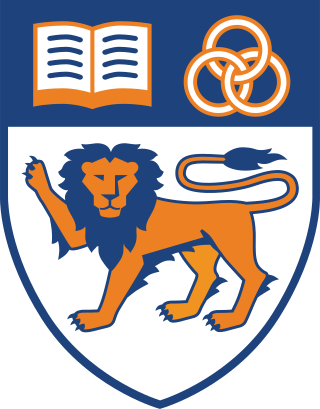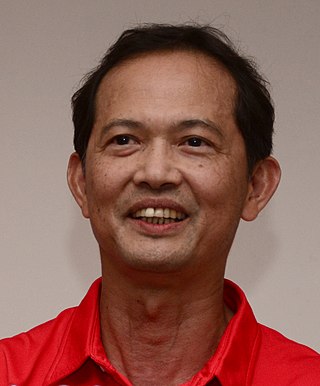
The National University of Singapore (NUS) is a national public research university in Singapore. It was officially established in 1980 by the merger of the University of Singapore and Nanyang University.

The Singapore Management University (SMU) is a publicly-funded private university in Singapore. Founded in 2000, SMU is the third oldest autonomous university in the country, modelling its education after the Wharton School. The university is triple accredited by AACSB, EQUIS and AMBA. In 2024, SMU was ranked 44th in the world for Business and Management Studies, while also placing in the top 100 for Economics and Finance by QS.
Koh Buck Song is a Singaporean writer, poet, and country brand adviser. He is the author and editor of more than 40 books, including nine books of poetry and haiga art. He works as a writer, editor and consultant in branding, communications strategy and corporate social responsibility in Singapore. He has held several exhibitions as a Singaporean pioneer of haiga art, developed from a 16th-century Japanese art form combining ink sketches with haiku poems.
Tommy Koh Thong Bee is a Singaporean diplomat, lawyer, professor and author who served as Singapore's Permanent Representative to the United Nations between 1968 and 1971.
The Lee Kuan Yew School of Public Policy is an autonomous postgraduate school of the National University of Singapore (NUS), named after the late former Prime Minister of Singapore, Lee Kuan Yew.

Jack Sim Juek Wah, also known as Mr Toilet, is a Singaporean entrepreneur and philanthropist who is the founder of the World Toilet Organization and World Toilet Day initiative. He is also the founder of the Restroom Association of Singapore.

Ho Kwon Ping is a Singaporean businessman. He is the founder and executive chairman of Banyan Group and Laguna Resorts and Hotels, and executive chairman of Thai Wah Public Company.
The European Union (EU) Centre in Singapore is part of a global network of European Union Centres of Excellence. Following the launch of EU Centres of Excellence in the US and Canada in 1998, there are now 37 Centres located in Australia, Canada, Hong Kong, Japan, Macao, New Zealand, Russia, South Korea, Taiwan and the United States.

Tan Tai Yong is a Singaporean academic who is the current President of Singapore University of Social Sciences. He served as the President of Yale-NUS College from 2017 to 2022. He is also Chairman of the Management Board of the Institute of South Asian Studies, an autonomous university-level research institute in NUS. He was a former Nominated Member of Parliament and served from 2014 to 2015.

Tan Chorh Chuan is a Singaporean college administrator and professor who served as the second president of the National University of Singapore between 2008 and 2017. He is currently a professor at the National University of Singapore.
The Singapore Institute of International Affairs (SIIA) is a Singaporean research institute and think tank which focuses on international relations, especially in ASEAN and the Asia-Pacific (APAC). The Institute conducts research, hosts events, and plans conferences that deal with pressing issues in international affairs. It is the oldest think tank in Singapore, being founded in 1961.

Yale-NUS College is a liberal arts college in Singapore. Established in 2011 as a collaboration between Yale University and the National University of Singapore, it is the first liberal arts college in Singapore and one of the first few in Asia. With an average acceptance rate of 5.2%, it is among the most selective institutions in the world. Yale-NUS was the first institution outside New Haven, Connecticut that Yale University had developed in its 300-year history, making Yale one of the first American Ivy League schools to establish a college bearing its name in Asia.

Lee Chean Chung is a Malaysian politician, researcher and environmental activist who has served as the Member of Parliament (MP) for Petaling Jaya since November 2022. He served as Member of the Pahang State Legislative Assembly (MLA) for Semambu from May 2013 to November 2022. He is a member of the People's Justice Party (PKR), a component party of the Pakatan Harapan (PH) coalition. He has also served as the Communications Director of PKR since July 2022, Vice Chairman of PKR of Pahang since 2019, Division Chief of PH of Indera Mahkota since 2018 and Division Chief of PKR of Indera Mahkota since 2011. Currently, He holds membership in Sustainable Energy Development Authority (SEDA) and ASEAN Parliamentary for Human Rights (APHR). YB Lee is also the Chairman of Centre for Regional Strategic Studies (CROSS) and President of Malaysia-China Technology Promotion Association.
Intan Azura binte Mokhtar is a former Singaporean politician. A member of the governing People's Action Party (PAP), she was the Member of Parliament (MP) for the Jalan Kayu division in Ang Mo Kio GRC between 2011 and 2020.
Peter Ho Hak Ean is a retired Singaporean senior civil servant. Ho was the chairman of the Urban Redevelopment Authority, Social Science Research Council, Singapore Centre for Environmental Life Sciences Engineering and National Supercomputing Centre. Ho is also a member of the council of the International Institute for Strategic Studies and a senior advisor to the Centre for Strategic Futures.

Koh Lian Pin is a Singaporean conservation scientist. He is Vice President, and Chief Sustainability Scientist at the National University of Singapore (NUS), where he oversees and champions sustainability-related research. He employs a whole-of-University strategy to bridge academia with policy makers, industry and civil society, driving the change needed across all sectors to tackle the twin planetary crises of climate change and biodiversity loss.

Paul Anantharajah Tambyah, is a Singaporean doctor and professor of infectious diseases, a politician, and a writer. He is President of the Asia Pacific Society of Clinical Microbiology and Infection and also President of the International Society for Infectious Diseases. He is also the Chairman of the Singapore Democratic Party, a position he has held since September 2017.

Leong Mun Wai is a Singaporean politician and former investment banker. A member of the opposition Progress Singapore Party (PSP), he has been a Non-Constituency Member of Parliament of the 14th Parliament of Singapore since 2020 and served as Secretary-General of the PSP from 2023 to 2024.











